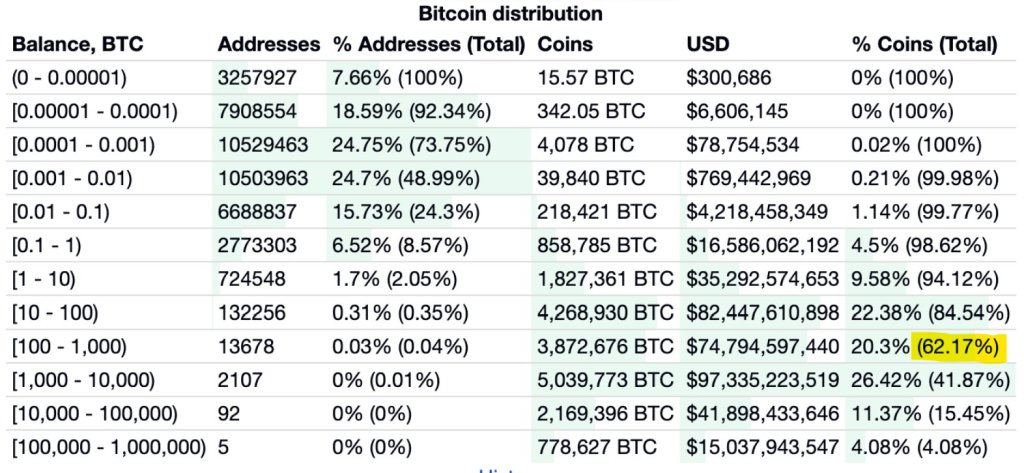0.04% of Bitcoin Holders Control 62% of Circulating Supply
New data from BitInfoCharts reveals that a small fraction of Bitcoin (BTC) addresses, only 0.04%, control a significant portion of the circulating supply, specifically 62%. This information raises concerns about the decentralization of Bitcoin and whether it truly fulfills its promise of a democratized financial system.
Bitcoin’s Promise of Decentralization
When Bitcoin was launched by Satoshi Nakamoto, the intention was to create a decentralized peer-to-peer electronic money system. The core principles of this platform were community involvement and decentralization.
Growing Gap Between Whales and Retailers
The data discovered by @GRomePow indicates that there is an increasing wealth disparity between a small group of large BTC holders known as whales and the majority of users who are mainly retailers. While the wealthiest Bitcoin addresses hold 62% of the circulating supply, most BTC holders possess only minuscule amounts.

Challenges to Bitcoin’s Decentralization Claim
This growing wealth gap has led some to argue that Bitcoin’s wealth distribution is not different from traditional financial systems, undermining its claim to decentralization.
Bitcoin’s Decentralized Nature
However, staunch Bitcoin proponents argue that wealth distribution and decentralized rules are separate concepts. They believe that Bitcoin’s decentralized nature lies in its underlying technology, which allows anyone to participate in the network without intermediaries or central authorities.
They also highlight that BTC holders are not involved in securing or approving the network. These entities could be corporations like MicroStrategy and Tesla, who have accumulated billions of dollars worth of Bitcoin as part of their investment strategies.
Reasons Behind the Growing Wealth Disparity
The concentration of wealth in Bitcoin is primarily attributed to early adopters who acquired significant amounts of BTC during its early stages. As the value of the cryptocurrency has surged, these early holders have amassed substantial wealth. It is estimated that Nakamoto controls 1 million BTC, and individuals like Hal Finney’s estate own billions worth of coins mined using their desktops.
In addition, Bitcoin’s decentralized nature allows individuals to choose how they manage their holdings. Some prefer to store their BTC in secure wallets, while others keep them on exchanges for easier trading. Glassnode data from early December 2023 reveals that around 20% of all circulating Bitcoin is held on exchanges.
Hot Take: The Debate Continues
The concentration of wealth among a small percentage of Bitcoin holders raises questions about the true decentralization of the cryptocurrency. Critics argue that this disparity undermines its claim to be a democratized financial system. However, proponents maintain that decentralization lies in Bitcoin’s technology and its ability to operate without intermediaries or central authorities. The ongoing debate surrounding Bitcoin’s wealth distribution will likely continue as the market evolves.





 By
By
 By
By
 By
By
 By
By

 By
By